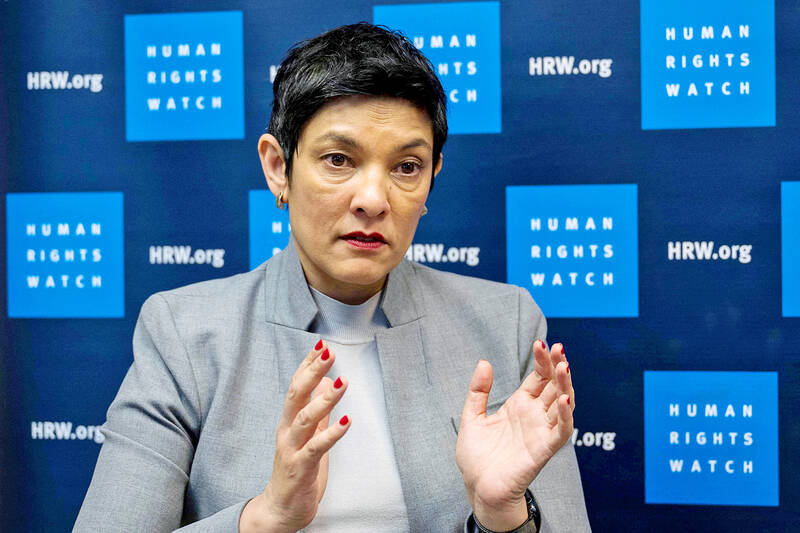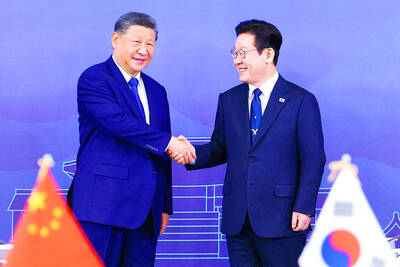People’s rights are being suppressed and threatened everywhere in the world, from wars to selective government outrage about some abuses and silence about others because of “political expediency,” Human Rights Watch (HRW) said on Thursday.
“We only have to look at the human rights challenges of 2023 to tell us what we need to do differently in 2024,” Human Rights Watch said in its annual global report.
Armed conflicts have mushroomed, leading with the Israel-Hamas war, and the issue is how governments respond to them, Tirana Hassan, the New York-based watchdog’s acting executive director, told a news conference. “It needs to be an end to double standards.”

Photo: AFP
As an example, Hassan said that many governments quickly and justifiably condemned the “unlawful” killings and atrocities by the Palestinian militant Hamas group when it attacked southern Israel on Oct. 7 last year, killing hundreds and taking hostages.
“Yet many of the governments that condemned Hamas’ war crimes have been muted in responding to the war crimes committed by the Israeli government,” she said.
Such selective outrage sends a dangerous message that some people’s lives matter more than others and shakes the legitimacy of the international rules that protect everyone’s human rights, she said.
Human Rights Watch praised South Africa for seeking a ruling from the International Court of Justice on whether Israel is committing genocide in Gaza in a case that began on Thursday.
Hassan said that other countries including the US should support South Africa’s action “and ensure that Israel complies with the court’s decision.”
The report said that tradeoffs on human rights in the name of politics are also clear.
It cited the failure of many governments to speak out about the Chinese government’s repression and control over civil society, the Internet and media.
“Chinese authorities’ cultural persecution and arbitrary detention of a million Uighurs and other Turkic Muslims amount to crimes against humanity,” it said. “Yet many governments, including in predominantly Muslim countries, stay silent.”
The report described the US and the EU as ignoring their human rights obligations in favor of politically expedient solutions.
“US President Joe Biden has shown little appetite to hold responsible human rights abusers who are key to his domestic agenda or are seen as bulwarks to China,” it said. “US allies like Saudi Arabia, India and Egypt violate the rights of their people on a massive scale, yet have not had to overcome hurdles to deepen their ties with the US.”
“Vietnam, the Philippines, India and other nations the US wants as counters to China have been feted at the White House without regard for their human rights abuses at home,” it said.

‘CHILD PORNOGRAPHY’: The doll on Shein’s Web site measure about 80cm in height, and it was holding a teddy bear in a photo published by a daily newspaper France’s anti-fraud unit on Saturday said it had reported Asian e-commerce giant Shein (希音) for selling what it described as “sex dolls with a childlike appearance.” The French Directorate General for Competition, Consumer Affairs and Fraud Control (DGCCRF) said in a statement that the “description and categorization” of the items on Shein’s Web site “make it difficult to doubt the child pornography nature of the content.” Shortly after the statement, Shein announced that the dolls in question had been withdrawn from its platform and that it had launched an internal inquiry. On its Web site, Le Parisien daily published a

China’s Shenzhou-20 crewed spacecraft has delayed its return mission to Earth after the vessel was possibly hit by tiny bits of space debris, the country’s human spaceflight agency said yesterday, an unusual situation that could disrupt the operation of the country’s space station Tiangong. An impact analysis and risk assessment are underway, the China Manned Space Agency (CMSA) said in a statement, without providing a new schedule for the return mission, which was originally set to land in northern China yesterday. The delay highlights the danger to space travel posed by increasing amounts of debris, such as discarded launch vehicles or vessel

RUBBER STAMP? The latest legislative session was the most productive in the number of bills passed, but critics attributed it to a lack of dissenting voices On their last day at work, Hong Kong’s lawmakers — the first batch chosen under Beijing’s mantra of “patriots administering Hong Kong” — posed for group pictures, celebrating a job well done after four years of opposition-free politics. However, despite their smiles, about one-third of the Legislative Council will not seek another term in next month’s election, with the self-described non-establishment figure Tik Chi-yuen (狄志遠) being among those bowing out. “It used to be that [the legislature] had the benefit of free expression... Now it is more uniform. There are multiple voices, but they are not diverse enough,” Tik said, comparing it

RELATIONS: Cultural spats, such as China’s claims over the origins of kimchi, have soured public opinion in South Korea against Beijing over the past few years Chinese President Xi Jinping (習近平) yesterday met South Korean counterpart Lee Jae-myung, after taking center stage at an Asian summit in the wake of US President Donald Trump’s departure. The talks on the sidelines of the APEC gathering came the final day of Xi’s first trip to South Korea in more than a decade, and a day after his meeting with the Canadian prime minister that was a reset of the nations’ damaged ties. Trump had flown to South Korea for the summit, but promptly jetted home on Thursday after sealing a trade war pause with Xi, with the two